Temple Law students Lilah Thompson and Kimya Forouzan share their reflections on the third event in the Sheller Center’s “Making Sense of the Legal Headlines” series.
Last week, Professors Jaya Ramji-Nogales and Peter Spiro, and Jonathan Grode, Esq. spoke about the Refugee and Travel Bans imposed by Executive Order on January 27, 2017 and March 6, 2017.
For attorney and Temple Law alum Jonathan Grode, the effects were felt personally by his clients, the Assali family, who were coming to the United States through a family-based category. Although their process began in 2003, they were unable to travel to the United States until January of this year. Subsequently, they got caught up in the travel ban, and Mr. Grode was called to help.
President Trump has stated on numerous instances that his goal is a “Muslim ban.” However, the Assalis, a Christian family, were still excluded from entering the United States because they came from one of the countries on the travel ban list. Mr. Grode was eventually able to get the Assalis back into the United States after much legal and political footwork, as well as appeals to the media. However, the process was difficult and uncertain. Mr. Grode, who witnessed the ultimate family reunification at JFK Airport, stated that the moment was “like watching your child be born.”
In an effort to justify his refugee and travel bans, President Trump has persistently mischaracterized refugees. He has called refugees “illegal immigrants,” and has stated that until the government can institute an “extreme vetting” process, no refugees should be allowed into the U.S. This begs many questions: Who are refugees? Where do they come from? Why do they flee? How are they screened and vetted?
Who qualifies as a refugee?
In order to be deemed a refugee, an individual must prove that they have have a well-founded fear of persecution based on race, religion, nationality, political opinion or membership in a particular social group. Over 21 million people are refugees, 51% of whom are children. The number of refugees in the world is currently at the highest level ever recorded in human history.
Why do refugees flee?
Currently, 53% of refugees worldwide come from Syria, Afghanistan and Somalia. An estimated 11 million Syrians have fled their homes since the outbreak of the violent civil war in 2011. While situations in countries facing mass displacement and flight are different, they share important commonalities, including violence, instability, and persecution. Although President Trump has lumped refugees in with “radical Islamic terrorists,” refugees are in fact often fleeing the same terror that the U.S. is claiming to be fighting. Refugees are not simply crossing borders looking for a new life; they are forced out of their homes because it is too dangerous to survive there.
How are refugees screened, vetted, and processed to come to the United States?
As Prof. Ramji-Nogales stated, “we are already conducting extreme vetting.” In fact, Prof. Ramji-Nogales pointed out, refugees receive “the most extensive set of checks of anyone entering the United States.” Under the U.S. Refugee Admissions Program (USRAP), an interagency process that includes three primary U.S. Government agencies—Department of State, Department of Homeland Security (DHS), and the Department of Health and Human Services (HHS)—refugees are vetted based on specific requirements. This includes an in-person interview with DHS, security checks, and a medical exam. Due to these strict requirements, the screening process alone takes anywhere from 18 to 24 months. In other words, refugees are lawfully entering the United States. Once they are approved and processed to come to the U.S., refugees start on a path to citizenship.
How much does the United States do to help refugees?
Prof. Ramji-Nogales described the number of refugees the U.S. takes as a “drop in the bucket.” The ceiling for refugee admission in the U.S. is set each year; in 2015, it was 70,000. In 2017, President Trump halted even this small contribution to resettling the world’s most vulnerable people.
How does the Muslim Ban fit into the larger global issue of refugee resettlement?
Professor Spiro detailed the timeline of the recent Muslim Ban and its effects on the global issue of refugee resettlement. He detailed the specifics of the first ban, implemented on January 27, 2017, which suspended U.S. entry for those from Iran, Iraq, Yemen, Syria, Libya, and Sudan. The order went into effect immediately, and created chaos in airports throughout the United States. Additionally, the ban affected not just refugees, but also visa and green card holders, many of whom had been residing in the United States for extended periods of time but had simply traveled outside of the country when the bans went into effect. On February 3rd, a nationwide temporary restraining order was issued, and Customs & Border Protection resumed “standard policy.”
On March 6th, a second ban was ordered. The new order affected individuals from the same countries as before, although Iraq was excluded and it no longer included existing visa holders. District courts in Hawaii and Maryland shortly thereafter issued nationwide preliminary injunctions blocking the second ban.
Why is this all important?
There is a misperception that refugees are somehow dangerous terrorists. The idea that the U.S. can skirt its international obligations under the 1951 Refugee Convention to take in refugees because we equate refugees with terrorists is illogical, immoral, and illegal.
When we turn our back on refugees, we tell the world that the U.S. cannot tell the difference between a refugee, who is fleeing terror, from a terrorist, who is the oppressor. Our action says that, even with all of the facts about what refugees face, and the fact that they are screened and vetted more than any other individual who sets foot on U.S. soil, we do not care to help. It says that U.S. citizens deserve peace of mind over a refugee child’s safety from violence or death.
However, this can change. We can take in more refugees. We can fulfill our obligations under international law. We can support non-profit organizations resettling refugees, like HIAS Pennsylvania and Nationalities Service Center here in Philadelphia.
If we can contribute anything to this situation, it is information and understanding. In the face of fear politics, we must come together as a community to better understand the refugee process so we can better act towards changing the narrative.
For more information about immigration and refugee law, please check out this Resource Guide, created by Carla Wale from the Law Library.

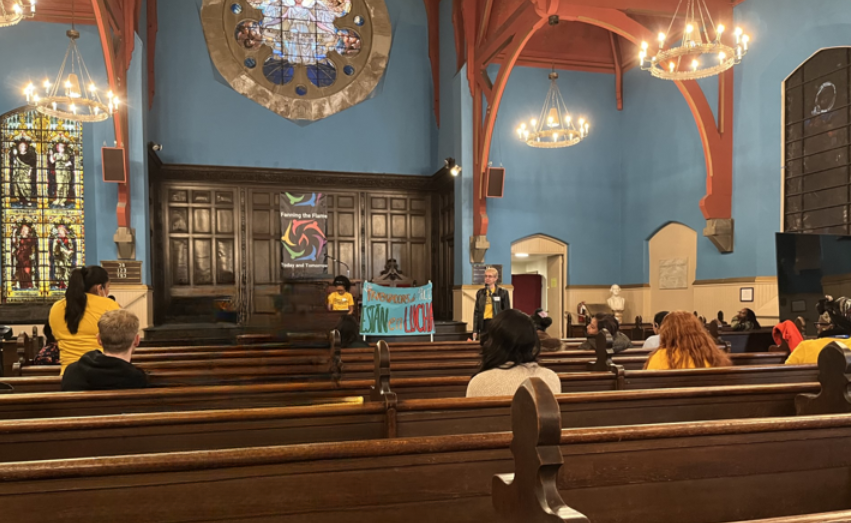
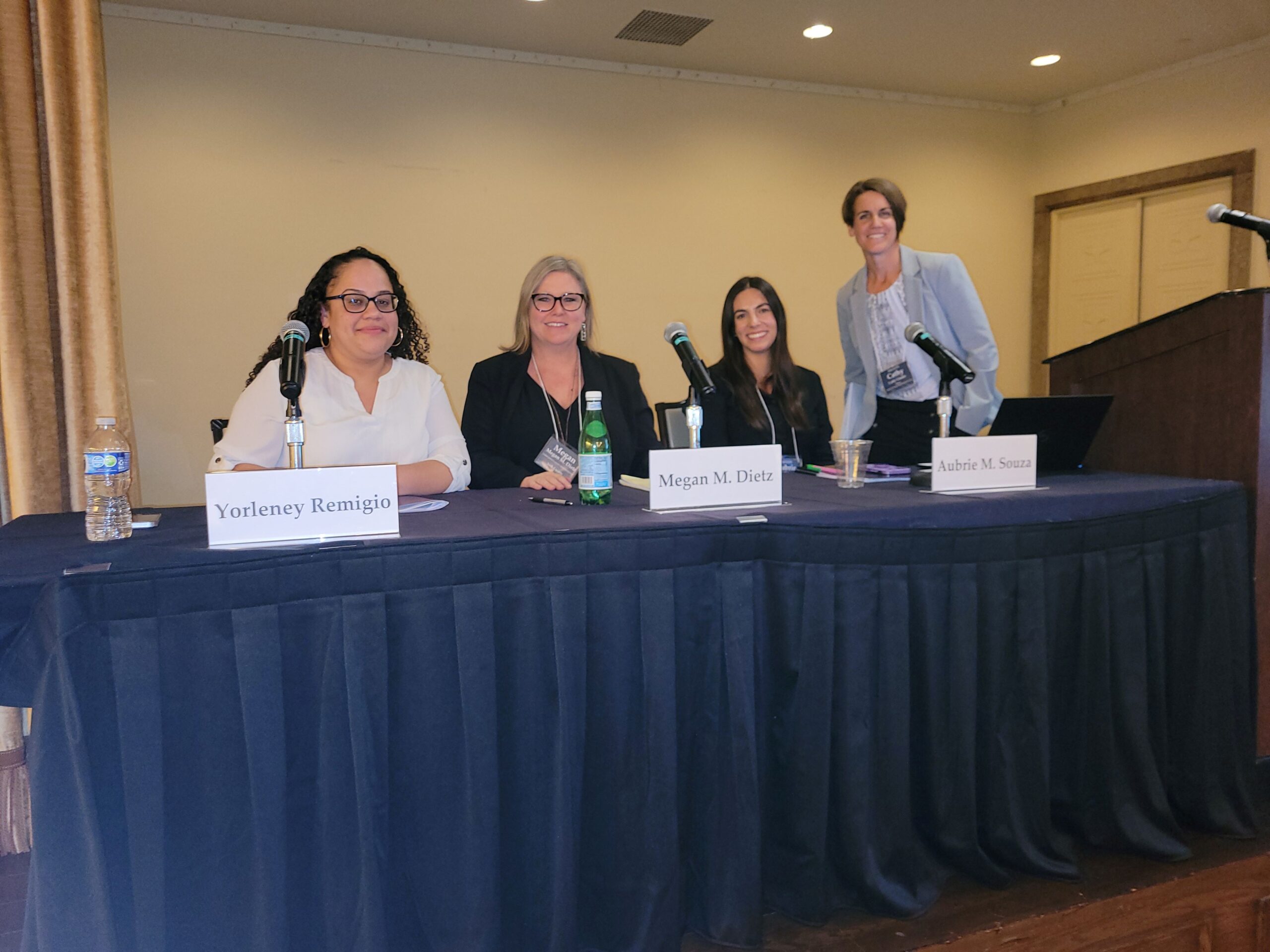
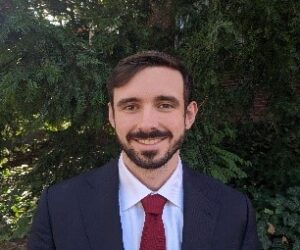
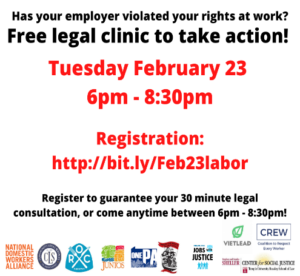 In December, CREW held their first Zoom legal clinic. I worked to organize students to help with intake. The goal of the clinic was to both educate workers and ensure enforcement against employers who are violating the laws. Before the clinic, OnePA and Community Legal Services led trainings to teach us specifically about Philadelphia’s worker protection laws and how to work with potential clients coming from CREW’s member organizations. The clinic Zoom was set up such that organizers from CREW held Know-Your-Rights trainings in the main room, while the law students and other organizers met with workers individually in breakout rooms. Volunteer lawyers were available to field questions from the individual meetings and plan out next steps.
In December, CREW held their first Zoom legal clinic. I worked to organize students to help with intake. The goal of the clinic was to both educate workers and ensure enforcement against employers who are violating the laws. Before the clinic, OnePA and Community Legal Services led trainings to teach us specifically about Philadelphia’s worker protection laws and how to work with potential clients coming from CREW’s member organizations. The clinic Zoom was set up such that organizers from CREW held Know-Your-Rights trainings in the main room, while the law students and other organizers met with workers individually in breakout rooms. Volunteer lawyers were available to field questions from the individual meetings and plan out next steps.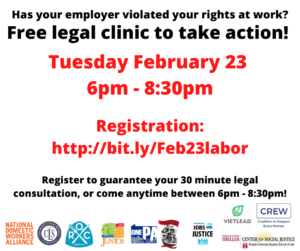
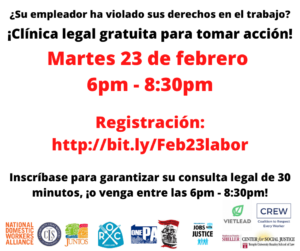
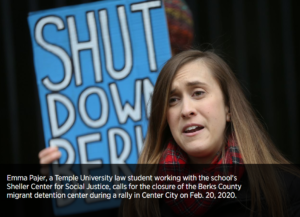 Emma Pajer (’20), who helped to draft the lawsuit, spoke at a
Emma Pajer (’20), who helped to draft the lawsuit, spoke at a 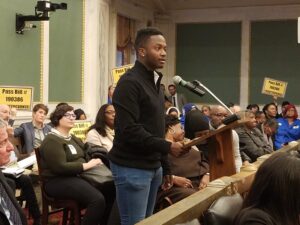 Xavier and colleagues Julia Sheppard and Sarah Kim have spent the semester researching why so many landlord/tenant cases in Philadelphia result in default judgments — which then lead quickly to eviction.
Xavier and colleagues Julia Sheppard and Sarah Kim have spent the semester researching why so many landlord/tenant cases in Philadelphia result in default judgments — which then lead quickly to eviction.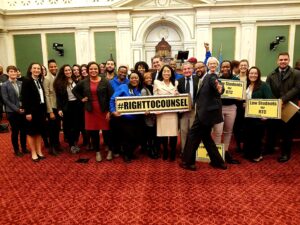
 We’re excited to welcome Shanda Sibley, who joined the Sheller Center this fall as Assistant Clinical Professor of Law. Prof. Sibley’s clinic, which will start in the spring, will focus on collateral consequences for people involved in the criminal legal system. Collateral consequences are penalties imposed on people in addition to the official sanctions for their actions – e.g., loss of civil rights (such as the right to vote), restrictions on employment and housing, ineligibility for public benefits, mistreatment while in prison, fees and costs of all sorts, and much more.
We’re excited to welcome Shanda Sibley, who joined the Sheller Center this fall as Assistant Clinical Professor of Law. Prof. Sibley’s clinic, which will start in the spring, will focus on collateral consequences for people involved in the criminal legal system. Collateral consequences are penalties imposed on people in addition to the official sanctions for their actions – e.g., loss of civil rights (such as the right to vote), restrictions on employment and housing, ineligibility for public benefits, mistreatment while in prison, fees and costs of all sorts, and much more.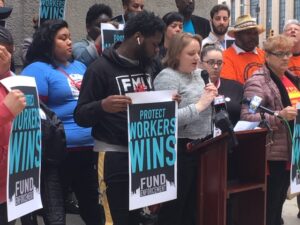
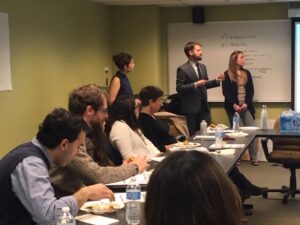 ether with the
ether with the 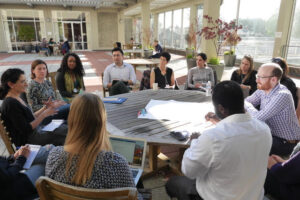
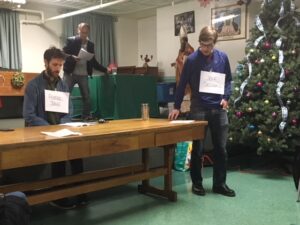
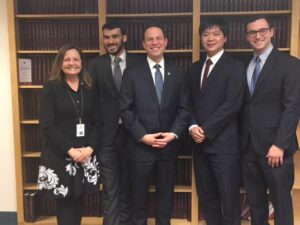
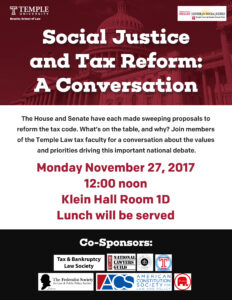 What the heck is going on with tax “reform” — and what are the implications for social justice? Join a conversation on that subject, sponsored by the Sheller Center and a diverse group of student organizations, on MONDAY, NOVEMBER 27, from 12-1 pm, in Klein 1D. Faculty panelists will include Profs. Andrea Monroe, Kathy Mandelbaum, Robert Bartow, Jan Ting and Richard Greenstein. Lunch will be provided.
What the heck is going on with tax “reform” — and what are the implications for social justice? Join a conversation on that subject, sponsored by the Sheller Center and a diverse group of student organizations, on MONDAY, NOVEMBER 27, from 12-1 pm, in Klein 1D. Faculty panelists will include Profs. Andrea Monroe, Kathy Mandelbaum, Robert Bartow, Jan Ting and Richard Greenstein. Lunch will be provided.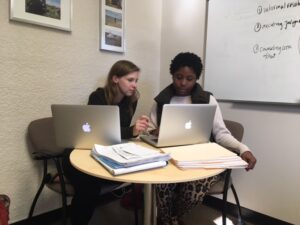
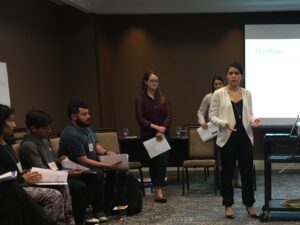 Social Justice Lawyering Clinic Students Tessa Carson (’17), Emily Diaz (’18), and Ashley Rotchford (’18) created the
Social Justice Lawyering Clinic Students Tessa Carson (’17), Emily Diaz (’18), and Ashley Rotchford (’18) created the 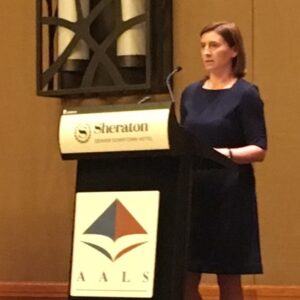
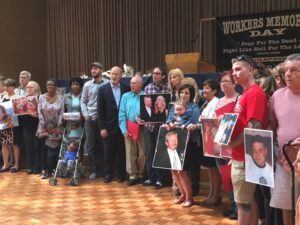
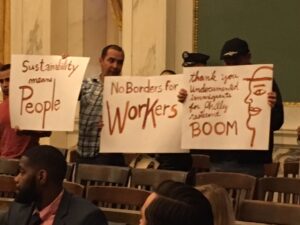 nering with immigrant chefs and taking its local dinner series nationwide.
nering with immigrant chefs and taking its local dinner series nationwide.
 ter, where I coordinate and escort clients to necessary medical appointments as a part of the Refugee Health Access team. Additionally, I work as a volunteer interpreter by appointment at HIAS, interpreting for Farsi-speaking clients. Often times, this work is exhausting, both mentally and emotionally.
ter, where I coordinate and escort clients to necessary medical appointments as a part of the Refugee Health Access team. Additionally, I work as a volunteer interpreter by appointment at HIAS, interpreting for Farsi-speaking clients. Often times, this work is exhausting, both mentally and emotionally.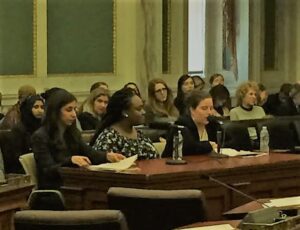
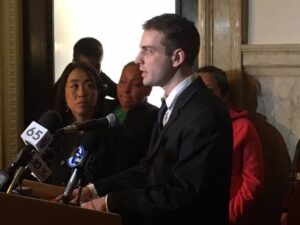 Group on Arbitrary Detention, co-wrote an Amicus Brief on behalf of psychological providers in the state litigation related to the licensing of the facility, and created educational materials to bring these practices to light. It was an honor to be a part of these efforts, working closely with seasoned practitioners and community members alike. We got to have a direct hand in advocating on behalf of some of the most vulnerable immigrants coming to the United States.
Group on Arbitrary Detention, co-wrote an Amicus Brief on behalf of psychological providers in the state litigation related to the licensing of the facility, and created educational materials to bring these practices to light. It was an honor to be a part of these efforts, working closely with seasoned practitioners and community members alike. We got to have a direct hand in advocating on behalf of some of the most vulnerable immigrants coming to the United States.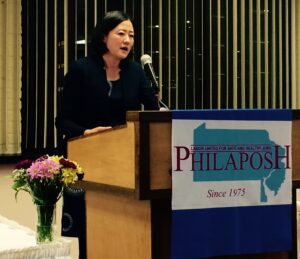
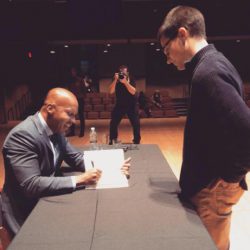
 Fifty-nine organizations, including the Sheller Center for Social Justice, filed an
Fifty-nine organizations, including the Sheller Center for Social Justice, filed an 
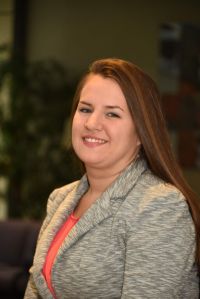 Newly graduated and on her way to a judicial clerkship, Emily Bock was
Newly graduated and on her way to a judicial clerkship, Emily Bock was  Master Sante Reaves, Ms. M, Ms. M’s son, Malcolm Ingram 3L and Prof. Sarah Katz.
Master Sante Reaves, Ms. M, Ms. M’s son, Malcolm Ingram 3L and Prof. Sarah Katz. Bradley Napier (pictured) and Emily Bock (both Sheller Center Advanced Intensive Clinical students) successfully represented a client in a wage claim at the First Judicial District Arbitration Center. They got an award of about $2600 for unpaid wages for the client. The client was a construction worker who worked on a house and was paid only a portion of his wages.
Bradley Napier (pictured) and Emily Bock (both Sheller Center Advanced Intensive Clinical students) successfully represented a client in a wage claim at the First Judicial District Arbitration Center. They got an award of about $2600 for unpaid wages for the client. The client was a construction worker who worked on a house and was paid only a portion of his wages.